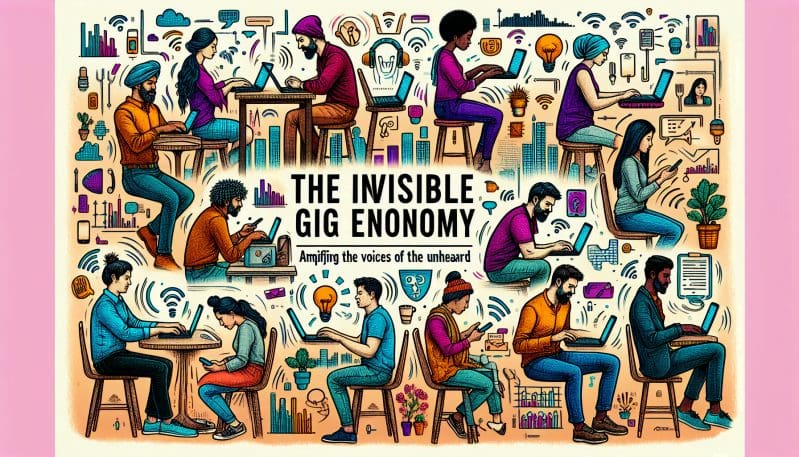The Invisible Gig Economy: Amplifying the Voices of the Unheard in Future Work Trends
- Home
- The Invisible Gig Economy: Amplifying the Voices of the Unheard in Future Work Trends
- Editors Desk
- February 5, 2024
- 0 Comments
As the fabric of the traditional job market continues to undergo reconstructive surgery, the gig economy emerges as a pivotal player in the narrative of the future of work. This burgeoning economic sector, celebrated for its flexibility and innovation, is often exemplified by flagship companies such as Uber and Airbnb. These platforms have become synonymous with the freedom and entrepreneurial spirit that defines the gig economy. Yet, beyond this gleaming facade lies a less visible but equally significant segment of the workforce: the myriad of independent contractors, freelancers, and online micro-taskers who are the unsung heroes of the digital age. This blog post seeks to shine a light on these often-overlooked workers and the realities they face in an economy that lauds adaptability at the cost of security and stability.
The invisible gig economy represents a diverse array of individuals who perform tasks ranging from simple data entry to complex programming jobs, often without the fanfare that accompanies more well-known gig platforms. These workers fuel the engine of the digital economy, yet they frequently operate in the shadows, deprived of the traditional employment protections that shield other workers from the volatility of the market. The absence of job security, the lack of access to benefits such as health insurance and retirement plans, and the vulnerability to abrupt market fluctuations are just some of the perils they navigate on a daily basis. For them, the gig economy is not just a matter of convenience; it is a means of survival, a precarious balancing act between flexibility and financial uncertainty.
Despite these challenges, the invisible gig workforce remains integral to the global economic ecosystem. They are the translators who bridge language barriers, the customer service representatives who soothe frayed nerves, and the creatives who design the visual landscapes of countless websites. Yet, their voices are often muted when policies are crafted and future work trends are forecasted. It’s imperative that we unpick the complexities that shroud their daily experiences and begin to advocate for a more equitable gig economy.
But how can we achieve this? The conversation starts with acknowledging the gaps in current labor protections and extends to the development of industry standards and policies that cater to the unique needs of gig workers. This includes advocating for fair compensation, clearer contracts, dependable work hours, and safety nets that address the unpredictability inherent to gig work. Furthermore, we must explore avenues for these workers to organize and have a say in the direction and governance of the platforms on which they rely. Social security systems must be reimagined to accommodate the non-traditional work arrangements that are becoming increasingly commonplace. This is not just a mission for policymakers and industry leaders; it extends to all of us who benefit from the services and conveniences that these workers provide.
By drawing parallels to the broader initiatives of entities like the World Economic Forum, which aims to address employment challenges and shape the future of the workplace, we can identify areas that demand heightened scrutiny and innovation. The voices of the invisible gig workers should be amplified and their concerns integrated into the global discourse on the future of work to ensure that they are not merely surviving, but thriving in the dynamic workplace landscape. Providing visibility to this segment of the labor force is not simply about justice; it is about recognizing the indispensable role they play in our economy and safeguarding the dignity of all forms of work.
As we gaze into the horizon of the future of work, let us ensure that no worker, visible or invisible, is left behind. The evolution of the workplace beckons for an inclusive approach that harmonizes flexibility with security, ensuring that the gig economy fulfills its promise of innovation and opportunity for all who ply their trade within its bounds. It is a bold aspiration, but one well worth pursuing for the betterment of workers and the vibrancy of the global economy.
Choose Layout
Main Color Scheme
- RTL Version
- LTR Version

